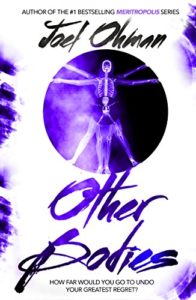

It’s no secret that the best dystopian fiction functions as social commentary; it serves a purpose, and unashamedly so. If the general fiction author shies away from announcing an overt theme in pursuit of story, the best dystopian fiction authors not only embrace theme, but start with theme and build their story upon it.
Why is this?
Well, the best dystopian fiction has something to say. It’s almost necessarily political in the way it paints us a picture of a future gone bad. It’s as if the author is holding up a mirror to society and saying, “And, oh, by the way, look at where this could lead. Is this really who we are, who we want to be?”
So, in the war of ideas, if the cable news talking heads serve as the shock troops, then the dystopian fiction author functions more like the covert operative that sneaks behind enemy lines and sows beguiling stories (less generously, propaganda) in order to win the hearts and minds of the people over to the other side. If the author is good at what they do, then it’s a peaceful entreaty—by painting a picture of a future gone bad, seemingly as a natural end result of society’s current beliefs, then it prompts readers to reconsider those very same beliefs they once took for granted.
Story in general, and dystopia more specifically, functions as weaponized worldview in that it operates behind the defenses of the reader.
Ask yourself this: has an argument on social media ever changed your mind? How about a debate on a cable news show? In fact, let’s take it a step further: have you ever found yourself, if even for a moment, actually considering (truly) the other point of view? Or, did the rising call to battle of the looming disagreement merely hasten your resolve to defend your position well?
I think we all know the answer…
But story is different. Our defenses are down when encountering a story. Religious tradition is replete with great storytellers using down-to-earth stories to illustrate great theological truths, the parables of Jesus being the obvious example. These great teachers know that story operates, not against reason, but somehow underneath and behind it, undergirding facts with a groundswell of emotions, heart, and feeling that contribute to making the rational argument that much more powerful.
Many stories—most stories, and most great advertisements too, for that matter—paint a picture of a better future, saying, in effect, you can have this if you believe this, but dystopian stories do the opposite. They paint a picture of a worse future, a future gone bad, often horribly bad, and say to the reader, you will suffer this if you continue to believe this. The utopian fairy tale gives us the blessing we can inherit if we follow the right path, while the dystopian story warns us of the destructive curse we will receive if we do not change course.
Have you ever had a flash forward to seeing yourself in the future? Maybe you’ve seen someone—say, reports that the Marlboro Man has throat cancer, with a big hole in his neck to breathe out of and you’re a smoker—and almost like a premonition of your future self, you see the image and you don’t like what you see so much that… you change. You put down the cigarette. You stop smoking.
From utopian promise to dystopian warning: “Eric Lawson, pictured in an undated Marlboro advertisement provided by his wife, Susan, died earlier this month. He was the fourth Marlboro Man actor to die of a smoking-related disease.” – LA Times
So dystopian fiction is doubly powerful in that way. Firstly, it’s powerful as any stories are: they cause you to see the world in a new way, to encounter someone else’s viewpoint, to see things through another’s eyes and sympathize with their plight. But secondly, dystopian novels also have the power to paint this picture of a future gone bad, and on a personal level that can be both uniquely terrifying and catalytic.
So, if the best dystopian fiction novels have a social commentary element as part of their very DNA, and are often almost necessarily political, then guess what? The subject matter tends to be controversial. Think George Orwell’s 1984 or Margaret Atwood’s The Handmaid’s Tale. But remember, here is where story can do things its clunky, mouth-breathing brother, argument, simply cannot. Generations of readers have found themselves questioning the role of government overreach—the “Big Brother” term itself now a part of our shared popular lexicon and shorthand for an intrusive, snooping Police State—thanks to the former, while exploring gender roles, theocratic government, and feminist thought in the latter.
Didn’t think you were reading something with so many complex themes and subtly worldview-shifting positions contained therein, you just wanted to enjoy a great story?
Exactly.
Think you can pick up on the themes in my newest dystopian thriller? The book is controversial, to say the least. But it might be the truest thing I’ve ever written. Judge for yourself. Get it now—for a limited time, just 99 cents: Click to buy on Amazon.











